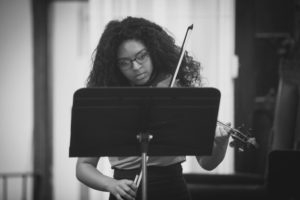Alex Rosario
Alexandra Rosario likes to say that she was “born into CMW.” The youngest of five siblings, Glademil (violin), Elvis (cello), Natasha (cello) and Jeffrey (violin), Alex demanded an instrument of her own long before she was old enough to officially join the program. Resident Musician Jesse Holstein restrung a violin with viola strings and a violist was born. Today, Alex is a confident 17-year-old senior at Paul Cuffee High School who sings and writes her own songs and poetry in addition to playing the viola. She was recently accepted to Columbia College, a women’s liberal arts college in South Carolina.
Because I have multiple siblings who were a part of the program before I was even born, I was legitimately born into CMW. It’s very, very close, tight-knit. It’s more like a family, honestly, for me.
One of my earliest memories is getting ready for a CMW concert. Before we would even get there my mom–she was the fashionista, all her kids needed to look stunning, like ravishing–would detangle my hair. I just remember sighing, thinking, “That’s going to hurt.” But we got ready. And I guess I was cute at that age because so many people were trying to hug me.
I remember watching my siblings on stage playing. I could see them progressing. First they started playing “Twinkle, Twinkle,” then different variations of “Twinkle” and then “Lightly Row” and so on and so forth. As time went on, I knew I wanted to play. I knew I wanted to play the viola.
When I was about 5, Jesse (Holstein) strung up a very small violin for me with viola strings and so I started playing. Jesse has been my teacher since I was in the second grade. He went on sabbatical, which is the only time I had another teacher, who was Annalisa (Boerner, CMW fellow).
I think Community MusicWorks is a place not just to be yourself, but to be a musician, be an artist. Music means confidence to me. I once had a friend who told me, “Oh, why do you want to be a musician? You know that artists make no money, right?” That’s not what it’s about. It’s about making sure that whatever you have to say is heard or whatever you have to feel is felt through your art.
I’ve met a lot of people through music, had a lot of great opportunities because of my love for music. More recently I’m being heard more in my community, either with voice or with my viola or just participating in different activities. I don’t think I was ever scared to be on stage. I love the stage. Sometimes, okay, I’m a little nervous, yeah. My heart is just pounding. It’s just going full speed. And then when I start playing, it’s like, “Okay. Cool,” Or sometimes it’s not even like that. I say, “You guys know me. Hey, what’s up? I will play this piece.”
CMW is a safe environment. It’s a place where everybody knows you. You’re not going to feel alone or discouraged. There have been plenty of times where I’ve been the only woman of color in the room but I still felt at home, and why? It’s because I know everybody, yes, but it’s more than that. Let’s say somebody didn’t know anyone in the room. I’m sure they’d feel a little discouraged or something, but everybody in the room is always filled with a warm and welcoming attitude. And that’s really important because we never know what’s happening in someone else’s life.
So, here’s the thing: a lot has been done [historically] to keep me out of a community like this. I just need respect. There’s been so much disrespect to people of color and not just in our country but in the world, and it’s upsetting to be a victim of it, you know? Because no matter how educated I am, people will still see me as below them, or whatever. It’s just upsetting. You’ve got to educate yourself. The school system isn’t going to teach you any of that. And you have to be involved to be able to even make an impact. And that’s what I’ve been doing, just going to rallies. I was already involved with other nonprofit organizations for youth.
We break down a lot of questions in Phase II [CMW’s teen program], tricky questions. We have talked about certain political things and it just gives me leeway to have to listen to someone else’s perspective. You’ve known everybody for your whole life. So it’s cool to be in a safe setting to have a conversation, even if you are on different sides of the table. It’s like, “Yeah, I’m going to listen to you and I’m still going to respect you,” and that’s honestly all the world needs to do.
Classical music is a very important base in music history. If it wasn’t for CMW educating me on this, who would have, with all the music programs being cut? I love Haydn. I remember being in one of the music camps and a teacher talking about Haydn. He said, “You know, Haydn had a very good relationship with all of his colleagues and so everybody calls him Papa Haydn. So now we’re going to go play Papa Haydn.” So every time I see a Haydn piece, I’m like, “Ooh, Papa Haydn.”
I don’t think CMW’s trying to take away a culture while it’s teaching classical music. I think whatever culture walks into the door they’re ready to breathe it in and let it radiate. We can think of making hip hop, we can think classical music, we can think salsa, we can think merengue. We think of making all of these different sounds.
Something that speaks to me is being able to see my teacher play first violin at New Bedford Symphony and being able to say, “Yeah, I’ve known him since I was 2 and he’s taught me since I was about 6 and that could very well be me if I listen to what he’s saying,” not necessarily there in New Bedford, but a musician. I’m not going to take his presence for granted and he doesn’t take my presence for granted. And that makes our relationship so much stronger, just being able to walk in and say, “Hey, how are you? Okay, let’s get right to work” because I know there’s no time to waste. To other students, I want to say: If you want to learn, please practice and please ask for help if you need it. Please don’t take this for granted because there’s a kid on that wait list dying for the opportunity to even pick up a violin or a viola or a cello.
What I see for my future is playing viola, yup, singing, yup, being able to write my own music and travel and be an artist. There’s a saying: When the world is most in need, we have to turn to the artists for help.

